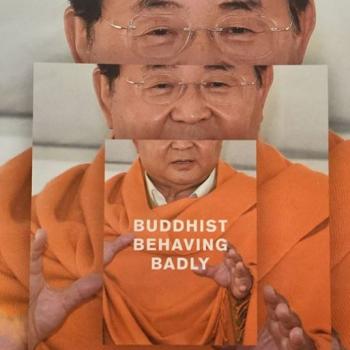 Is humankind naturally good or evil?
Is humankind naturally good or evil?
One might quickly sidestep the question, saying that in Buddhism, humanity has no inherent nature, and so the question makes no sense. However, Buddhism does teach that humans arise due to certain causes and conditions. The most important among those is the karma (moral actions) of one’s previous lifetime.
More on that in a moment. But first a Kantian interlude. WWKS: What would Kant say?
For simplicity’s sake, we won’t go all the way to Kant for that answer, but rather to one of the greatest living interpreters of Kant: Stephen Palmquist. We find the question posed and answered in one of Palmquist’s articles* on Kant:
Is human nature originally good or evil? Kant’s answer is (as usual) that it depends on the perspective from which the question is asked. If the question refers to the potential which resides in every human being as a “living” (animal), “rational” (human) and “accountable” (personal) being, then we must regard human nature as originally good, because these characteristics naturally “enjoin the observance of the [moral] law” [RBBR 26-28(21-23)]. However, if the question refers to the actual state of every human person in their first (and subsequent) moral act(s), then we cannot avoid the conclusion that an original (“radical”) evil exists in human nature. This conclusion is necessary not only if we base our judgment on “what we know of man through experience” [32(27)]; in addition, “it must be apprehended a priori through the concept of evil” [35(31)]. Thus, Kant concludes, “we may presuppose evil to be subjectively necessary to every man, even the best” [32(27)].
The key words here are that “it depends on the perspective from which the question is asked.”
It seems to me that an answer derived from early Buddhist texts would agree fully. Every human being, according to the 3rd noble truth, is capable of the end of all suffering, complete awakening, the eradication of all immoral mental factors.
This is the perspective of potential.
And yet, in the actual state of affairs, humankind is thoroughly caught up in suffering and its causes, the first and second noble truths. This situates a Buddhist understanding of human nature as neither optimistic nor pessimistic, but rather showing equal concern for both the faults in every human and his/her potential to rise above them.
The final line, too, should be taken to heart by Buddhists. While the worship of the Buddha as a perfected being pervades many traditions, the stories of his encounters with Mara (the tempter, literally death, a corollary to the Old Testament Satan) continued on through his life. The difference after his awakening was that the Buddha then could see Mara as he truly was, he could temptations or afflicted mental states as they were as mental states. And once they were seen, they lost power and disappeared.
One should also remember the teaching given by the Buddha at the end of his life. He told his weeping attendant Ananda that he (the Buddha) could be found in the Dharma (the teachings). So rather than project all of one’s hope and dreams onto this dying person and then weep over his imminent death, one should “look beyond” him/her to the higher truth that they have come to represent. Isn’t this what the Zen saying, “if you see the Buddha on the side of the road, kill him!” is all about?
We must presuppose evil in every man, even the best (evil being some moral fault or another). Don’t let your guard down. Don’t project perfection into this or that teacher.
But also: don’t lose hope. Don’t lose sight of the fact that all of that which causes suffering requires causes and conditions and those too are impermanent. The practical teachings of the 4th Noble Truth – the Noble 8-fold Path – provide the tools necessary to alleviate evil or suffering from one’s life.
*‘Does Kant Reduce Religion to Morality?’, Kant-Studien 83:2 (1992), pp.129-148.
Support independent coverage of Buddhism by joining a community of fellow learners/practitioners at Patreon.
‘Like’ American Buddhist Perspectives on facebook.











